European Pharmaceutical Students' Association
 | |
| Motto | "Bringing Pharmacy, Knowledge and Students Together" |
|---|---|
| Formation | 1982 |
| Type | Students association |
| Headquarters | Brussels, Belgium |
| Location | |
Official language | English, French |
President | Katarzyna Świderek (Poland) |
| Website |
www |
The European Pharmaceutical Students' Association (EPSA) is a non-profit, non-governmental, non-political and non-religious association which represents 42 Pharmacy Students' Associations from 35 countries, representing around 160.000 pharmacy students all around Europe. Its main objective is 'to develop the interests and opinions of European pharmacy students and to encourage contact and collaboration between them'. Actually, EPSA's motto '"Bringing Pharmacy, Knowledge and Students Together" reflects its will to promote the ideas and opinions of all the students of Pharmacy in Europe in order to improve the Education, the Pharmaceutical Profession and the Scientific Advances regarding Pharmacy. EPSA has its headquarters in Brussels, Belgium, in PGEU's offices. The Vice President of External Affairs works permanently there, collaborating with the Pharmaceutical Group of the European Union in the promotion of the role of the pharmacist as key actor in public health. Before being settled in Brussels, EPSA had its headquarters in Leiden, The Netherlands.
History
In 1978, the French Pharmacy Students' Association, ANEPF, invited students from other European countries to their Annual Congress in Nancy. The reason for this was to discuss the forthcoming European Community directives on the mutual recognition of pharmacy degrees and to compare studies between different countries. However, it turned out that this was more difficult than expected and required a longer time to be done. All participants expressed the need of further discussion between them. Therefore, it was proposed to the International Pharmaceutical Students' Federation, IPSF, to establish a European Sub-Committee (ESC) to discuss this, something which was done later on that year in the IPSF Annual Congress held in Edinburgh, United Kingdom.
The European Sub-Committee became independent 4 years later in 1982, changing its name to the European Pharmaceutical Students' Committee and was officially registered at the Tribunal d' Illkirch in France. The main purpose of this association was to work for the mutual recognition of pharmacy qualifications within Europe thus facilitating pharmacists, free movement.
EPSA got its present name ten years after its independence at the 15th Annual Congress in Helsinki, Finland, and became official after the 16th Annual Congress in Tübingen, Germany, in 1993.
Structure
General Assembly
According to the Terms of Reference and Standing Orders (TORSO), the highest decision-making body in EPSA is the General Assembly. General Assemblies are held twice a year, first during the Annual Congress in April, and then during the Autumn Assembly in October. This ensures a smooth running of the association whilst taking important decisions, including TORSO changes. The Ordinary Members of EPSA have the right to vote in any ballot of the association. In order to do it is necessary for Ordinary Members to present Annual Congress and Autumn Assembly Liaison Secretaries Reports and to pay their membership fees.
EPSA Team
The EPSA Team is elected every year at EPSA's Annual Congress. Led by the Executive, the EPSA Team cooperates all year with EPSA's member organisations in order to achieve EPSA goals.
Executive
The EPSA Executive manages the affairs of the association, and leads the work made in the name of EPSA on multiple fields.
European Sub-Committee (ESC) began with only one executive member, the chairperson. However, as the work load increased the need for additional board members became apparent. The ESC board was originally chosen at IPSF Congress. However, from 1982 onward, due to IPSF and ECS division, the Executive was chosen for the first time in an ESC Congress. Until 1998, the Board (composed of President, Vice-President, Secretary and Treasurer) was elected at the congress, and the rest of the Executive appointed. From 1998 onwards the entire Executive was elected at the congress, and was assisted by a number of sub-committees.
After that, several changes were made in the Executive with the introduction of Vice-Presidents and Immediate Past President positions. The latest changes applied at Kraków's Annual Congress in 2010 after EPSA's restructuring. The actual structure of EPSA Executive is composed of 8 elected members and one appointed Immediate Past President.
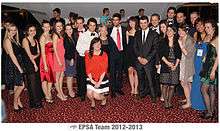
Educational Department
The Educational Department is supervised by the Vice-President of Education, and consists of five coordinators. Each of them is responsible of leading the projects that fall under their domain.
Public Relations Department
EPSA has three coordinators who are responsible for taking care of the administrative and technical aspects of the association, as well as helping the VP of Public Relations in the communication field.
Internal Affairs Department
This brand new department was established during the Annual Congress in Budapest in 2014. It's coordinators are responsible for a good communication with the Reception Committees and the Alumni group.
External Affairs Department
EPSA has two coordinators who are working close together with the Vice President of External Affairs to ensure sustainable incomes to EPSA.
Mobility Department
The Mobility Department has one coordinator, who leads the IMP project.
Parliamentary Council
The Parliamentary Council is the supervising Authority of the Association, ensuring that all decisions taken are done according to the association's regulations and to intervene if not so. The Parliamentary Council is composed of three members and one of them is elected as Parliamentarian. Each member should be from a different country.
Audit Committee
The EPSA accounts shall be audited by the Audit Committee, which should present a statement to General Assembly. Audit Committee consists of at least two persons which are appointed by Parliamentary Council and should be preferably from different countries.
Annual Congress Reception Committee Chairperson
The EPSA Annual Congress is the most important activity in all EPSA calendar. This is an event organized by both EPSA and the hosting association. In order to ensure its success, a Reception Committee (RC) is established, which chaired by the RC Chairperson, who is appointed as an EPSA Official and invited to Executive meetings with the aim of ensuring good communication between the EPSA team and the RC and hence a successful event.
Liaison Secretaries
EPSA Liaison Secretaries are elected or appointed by Member Organizations and their main task is to insure the implementation of EPSA projects at a local level and establish the connection between the executive of the National Organization and EPSA Executive. Liaison Secretaries are Official Delegates with voting rights at General Assembly.
Individual Mobility Project (IMP) Coordinator Board
The IMP Coordinator Board works to benefit the development of the EPSA Individual Mobility Project (IMP) as a whole. It consists of a Central IMP Coordinator and of National/Local IMP Coordinators as representatives of every EPSA member organization that is participating in the Individual Mobility Project. The IMP Central Coordinator is elected, as the other EPSA officials, in EPSA General Assembly while the National/Local IMP Coordinators are elected (or appointed) by the National/Local Association they are representing.
Member organizations
The EPSA Ordinary Member Organizations are National Pharmaceutical Students' Associations of countries within the geographical entity of Europe, which are recognised by the Council of Europe as independent countries. EPSA has also Associate Members – pharmaceutical students association that do not represent the majority of faculties in a country. EPSA has 24 Ordinary Members and 8 Associate Members, which are:
- AEFFUL Students' Association of the Faculty of Pharmacy of the University of Lisbon (Associação dos Estudantes da Faculdade de Farmácia da Universidade de Lisboa) - Portugal
- AFÖP Austrian Pharmaceutical Students' Association (Akademischer Fachverein Österreichischer Pharmazeut_innen)
- AHUPS Association of Hacettepe University Pharmacy Students'(Hacettepe Üniversitesi Eczacılık Öğrencileri Birliği)
- AISFA Italian Pharmaceutical Students' Association (Associazione Italiana Studenti di Farmacia)
- ANEPF French National Pharmaceutical Students' Association (Association Nationale des Etudiants en Pharmacie de France)
- APEF Portuguese Pharmaceutical Students' Association (Associação Portuguesa de Estudantes de Farmácia)
- asep Swiss student association in pharmacy (association suisse des étudiants en pharmacie)
- BPhD German Pharmaceutical Students' Association (Bundesverband der Pharmaziestudierend en Deutschland)
- BPhSA Bulgarian Pharmaceutical Students' Association (Българска фармацевтична студентска асоциация)
- BPSA British Pharmaceutical Students' Association
- CPSA Croatian Pharmacy and Medical biochemistry Students' Association (Udruga studenata farmacije i medicinske biokemije Hrvatske)
- CIUPSA Cyprus International University Pharmacy Students' Association (CIUPSA) - Cyprus
- CzPSA Spolek českých studentů farmacie (CzPSA) - Czech Republic
- FASFR Federation of Pharmacy Students' Associations in Romania (Federatia Asociatilor Studentilor Farmacisti din Romania)
- FEEF Federación Española de Estudiantes de Farmacia - Spain
- FiPSA Finnish Pharmaceutical Students' Association - Finland
- GPSF Greek Pharmaceutical Students Federation - Greece
- HCCM HCCM - Russia
- HUPSA Hungarian Pharmaceutical Students' Association (Magyar Gyógyszerészhallgatók Egyesülete) - Hungary
- IPSA Irish Pharmaceutical Students' Association (IPSA) - Ireland
- IUPSA Int Istanbul University Pharmaceutical Students' Association International - Turkey
- K.N.P.S.V. Royal Dutch Association of Pharmaceutical Students (Koninklijke Nederlandse Pharmaceutische Studenten Vereniging)
- LPSA Latvian Pharmacy Students' Association (Latvijas Farmacijas Studentu Asociacija)
- MPSA Macedonian Pharmaceutical Students' Association (Студентски Сојуз на Фармацевти на Македонија)
- MPSA Malta Pharmaceutical Students' Association
- MUPSA Marmara University Pharmaceutical Students' Association
- NAPSer National Association of Pharmacy Students of Serbia (Nacionalna Asocijacija Studenata Farmacije-Srbija)
- NoPSA Norwegian Pharmaceutical Students' Association
- SAFF Student Association of Pharmacy Faculty Sarajevo (SAFF) - Bosnia and Herzegovina
- SAFPUM Student Assembly Faculty of Pharmacy University of Mostar (Studentski zbor Farmaceutskog fakulteta Sveučilišta u Mostaru) - Bosnia and Herzegovina
- SPSA Slovakian Pharmaceutical Students' Association
- SFD Students' Pharmaceutical Association - Lithuania
- SNAPS Swedish National Association of Pharmaceutical Students
- SoP Students of Pharmaceutical Science - Denmark
- SSFB Bucharest Pharmaceutical Students Society (Societatea Studentilor in Farmacie Bucuresti
- SSSFD Students' Section of Slovene Pharmaceutical Society (Študentska sekcija Slovenskega farmacevtskega društva)
- USF Union of students pharmacy (Unie Student Farmacie) – Czech Republic
- VFSO Vlaams Farmaceutisch Studenten Overleg (VFSO) - Belgium
- YP Young Pharmacy (Mloda Farmacja) – Poland
Board of Trustees
The Board of Trustees is made up of professionals from the pharmaceutical field that assist the EPSA Executive with their expertise and contacts.
Honorary Life Membership
The Honorary Life Membership is granted to persons who have done remarkable work for the Association. Thanks to their work EPSA has improved substantially to meet its aims with professionalism and excellence. The Honorary Life Members (HLMs) are elected by General Assembly with a two-thirds majority.
Events
Annual Congress
The annual EPSA congress is the biggest and most important event in the EPSA calendar and takes place usually in April. It is where all EPSA members have the opportunity to meet and discuss EPSA and the Pharmacy Profession in General. The EPSA Annual Congress gathers an Educational Program (workshops and trainings), Social Program and the first EPSA General Assembly of the year is held during this event. EPSA Annual Congress is 7 days and 6 nights long. Toulouse, France was elected as the host city for the next Annual Congress in 2015. This is a chance for delegates from all the member organizations to come together to refuel their spirits and enthusiasm for the coming year. During the Annual Congress the new team of EPSA is elected for a one-year mandate by Ordinary Members of EPSA.
Autumn Assembly
The EPSA Autumn Assembly is EPSA's second most important event and takes place usually in October. The purpose of the EPSA Autumn Assembly is to provide an opportunity for EPSA members to review the work of the association half way through the year and at the same time to renew motivation and commitment to EPSA. The second EPSA General Assembly of the year is hold during Autumn Assembly. From 2004 to 2008, the EPSA Autumn Assembly was organised in collaboration with ESCP (European Society of Clinical Pharmacy) in an association of three events: the EPSA Annual 2nd Congress, the EPSA/ESCP Student Symposium and the ESCP Symposium. In the year of 2009 EPSA organised for the first time this event in collaboration with DIA (Drug Information Association). The next Autumn Assembly will be held in St. Julians, Malta, in October 2015.
Summer University
The Summer University is the third main EPSA event of the year and takes place usually in the end of July. This event is characterized by an educational and social agenda. Unlike the others events of EPSA already mentioned, during the Summer University is not held any EPSA General Assembly. The 17th edition of the Summer University will take place in the beautiful city of Lisbon, in Portugal, in July 2015.
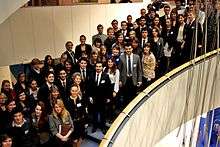
Annual reception
The Annual Reception (AR) is organised every year usually in February in Brussels, Belgium, in EPSA headquarters. The main aim of this event is for the EPSA team to present their work and projects to EPSA Board of Trustees, Partners and any institution which may be interested in EPSA's work. This event is structured in such a way as to have a round table discussion, chaired by EPSA President, in order to improve EPSA work and projects with the experience and ideas of these professionals. The topic of Annual Reception is chosen every year by EPSA Executive.
WHSS – World Healthcare Students' Symposium
The WHSS is a multi-professional four-day conference bringing together healthcare students from all around the world. The first joint symposium of world healthcare students took place in Malta from 7 to 12 November 2005. The symposium brought together 230 medical, pharmacy and nursing students from 42 countries in an international forum. The conference was intended to generate understanding and discussion between the professions, develop skills and awareness of concepts in multidisciplinary settings, and to create student advocates for a cooperative multidisciplinary approach to patient centred care to optimise health outcomes. There are a number of groups who work together to make this event happen which includes, obviously, EPSA. The other students' associations involved are: International Federation of Medical Students' Associations (IFMSA), International Pharmaceutical Students' Federation (IPSF), European Nursing Students' Association (ENSA), International Council of Nurses – Student Network (ICN-SN) and European Medical Students' Association (EMSA). Last WHSS was held in November 2013, in Lausanne, Switzerland.
Publications
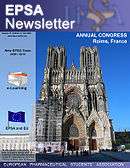
Newsletter
The EPSA Newsletter is the official EPSA publication. It is published three times a year, and is distributed to all EPSA members, contact organizations and sponsors. The Newsletter contains articles from the EPSA Officials, members and professionals and aims to spread EPSA's latest developments regarding its projects and to exchange knowledge and experiences between them. Including a broad variety of topics, it also contributes to the communication between students of member countries, who want to share ideas, comments and experiences. Additionally, it serves to highlight the important issues for pharmacy students across Europe and to pass information about future events. Each EPSA member association receives copies of the Newsletter that are further distributed to students across Europe, as well as to EPSA Observers and professional associations, in a total of 400 copies per edition.
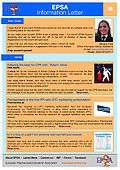
Monthly Dose
The EPSA Monthly Dose aims to bring relevant and useful updates about EPSA to students that are not very familiar with the association. It is published every month by the Publications Coordinator and contains information about relevant projects in EPSA and its member associations, upcoming events and recently published blog articles and publications. The Monthly Dose is sent by e-mail to all students, teachers and professionals that subscribe EPSA News e-group on the EPSA website and is also available as a printed version in the European faculties of pharmacy.
Report Booklet
The Report Booklet is published every year and it aims to present the conclusions taken by EPSA team during its mandate. This includes the conclusions taken from workshops, together with the result of the EPSA Annual Questionnaire and Statements of Opinion. The Immediate Past President is responsible to make this compilation and publish it. It is sent out to all students, professional and governmental organisations, EPSA members and all the faculties of pharmacy in Europe. As an official document of the association it states what European Pharmacy Students believe regarding a specific issue.
Social networks
EPSA also uses several social networks daily, such as Facebook, Twitter, and the EPSA blog to reach its students and provide them with updated information about its activities.
Projects
Annual Topic
Every year, the EPSA Annual Topic is voted by the General Assembly at the Annual Congress. The main purpose for the Annual Topic is to provide accurate information to European students for them to be able to gain valuable knowledge on the topic. To achieve this level of knowledge, EPSA will provide them with conferences by international speakers throughout the year, using the Annual Topic as a connecting thread between its events. All of the important information will be summarized in the Report Booklet at the end of the year. This year 2010/2011, the Annual Topic voted at Kraków Annual Congress is Pharmacovigilance: Keeping our eyes open and our medicines safe. It was chosen wisely, following EPSA's former Annual Topics regarding Information to Patients and Patents, Generics and Counterfeits, in order to complete the Pharmaceutical package.
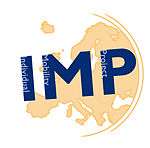
Individual Mobility Project (IMP)
The EPSA Individual Mobility Project is a long term project that gives the opportunity to students of pharmacy, particularly those in their late years of studies, and recent-graduates of pharmacy or pharmaceutical sciences from all European countries (members of EPSA) to gain an additional real-time work or experience, mainly in the fields of research and industry. Consequently, the IMP represents a unique opportunity for students and recent graduates to also in gain valuable knowledge of other European countries, customs, cultures as well as learning and getting to know the European diversity, which are the experiences encouraged also by the European Commission. This project allows the student or graduate to gain experience, knowledge, of the working practices and research techniques from the host company / institution in a project that can last between 2 and 12 months.
EPSA Voyage
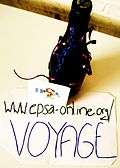
Voyage is an online platform consisting of profiles of individuals with basic information about an accommodation or service which they provide.
The platform enables each EPSA member to register, make a profile and offer e.g. their free bed or several beds. Any registered user may contact other Voyage users and hopefully arrange their stay at his or her place. For more information about EPSA Voyage it is best to visit Voyage website and see and try out the system on your own: www.epsa-online.org/voyage.
Voyage is an excellent opportunity to meet people with a focus similar to yours within the world of pharmacy. It gives a chance for cooperation and enables both parties to benefit from meeting new people whether sharing experiences or using her or his guest bed at a newly met foreign friend's house.
Annual Questionnaire
Each year, the topic of the Annual Questionnaire is chosen and questions concerning all fields related to this topic are included in the questionnaire which is then distributed to all member organizations to hand out to students. The results derived are then presented to professional organizations. This year, the topic for the annual questionnaire is Learning across Health professions - Multidisciplinary and Interdisciplinary Aspects of Pharmacy Education.
Lifelong Learning Certificate
The EPSA Lifelong Learning Certificate provides pharmacy students who actively participate in professional and educational activities organized or promoted by EPSA, the opportunity to gain tangible credit for these activities. It also introduces, at an early stage in the development of these future healthcare professionals, the important principles of Lifelong Learning as well as establishing the importance of documenting professional activities. The Certificate is granted to those who achieve 5 Lifelong Learning Points in one year (from April to March). The points can be obtained by attending the educational aspect of EPSA events or by attending an EPSA approved education project at a local level.

Training project
This new concept was introduced in 2005, and is led within EPSA by the Training Coordinator. Through Training events, students' knowledge on topics usually not included in the classical Pharmacy education (e.g. project management, communication and counseling skills) is improved by providing them training during EPSA events.
At a further stage, the most motivated and promising students can participate to the "Training New Trainers" event (TNT) in May, which will allow them to acquire strong leadership skills, and make them a part of the EPSA Training Team. They will consequently be able to train other students, spreading this knowledge to others at local/national events. The Training Project has the support from the European Commission, which can provide grants to organize such events through the Youth in Action Programme.
oBIGsity
The oBIGsity Project aims to make people aware of the increasing rate of obesity cases. This disease is found among both women and men at different ages. Students and people in general should know the consequences of this condition and most importantly how to prevent it.
Students' associations can participate by having a booth organized, where volunteer students will spread fliers and information regarding obesity (causes, treatment, how to avoid). If a video-projector will be available, some short videos can be displayed. At the university's cafeteria each sandwich will be given together with an apple, to promote health food!
EPSA Student Guide
This project aims to create an online database with all relevant information to EPSA and its members. This database will be available on EPSA official website and can be accessed by all pharmacists' students around Europe. It will contain information about the differences between the pharmacy course around Europe (number of year of studies, curricula, etc.), the profession itself (list of pharmacy organizations that exist in the country, health institutions, number of pharmacists in each country, etc.) and also the main characteristics of the country (currency, weather, life cost, etc.). With this project EPSA will create platform where students can find all information that they need about the country where they are going to experience a mobility project. All information collected by EPSA team during its mandate will be saved and organized on this database.
EPSA Alumni Database
Since the foundation of EPSA many students have spent much of their time working for the association. Due to all of them, EPSA is today one of the most respectful associations within Europe. The EPSA Alumni project aims to link the current EPSA team and members to the old ones, in order to make EPSA grow with the advice, expertise and great example of these people. This project offers the opportunity to maintain contact with all EPSA enthusiasts and also to keep the alumni benefiting from the association who they have given a lot of time and energy to. The alumni officer is in charge of contacting all alumni in order to gather their expertise and include them in trainings database. This project aims to create an alumni weekend during EPSA Annual Congress, an alumni magazine, a section on EPSA official website dedicated to this issue and also an online platform with all important and relevant information regarding alumni – the EPSA Alumni Database.
TWINNET Project
The Twinnet Project aims to connect students from different countries and also to provide them an extracurricular knowledge during a short period of time. The Team Mobility Project includes TWIN (bilateral), THREEN (three lateral) and Multilateral (QUATRINO, MULTI-Exchange Projects) student projects among different associations. The Vice President of Mobility ensures that the project is being taken properly and the Grant Coordinator helps Liaison Secretaries finding European Grants to support these mobility projects.
EPSA in European Union
The European Union is more than just a confederation of countries, but it is not a federal state. The EU policies in general, are the result of decisions taken by the institutional triangle made up of the Council, the European Parliament and the European Commission, all based in Brussels (the EU Parliament hold also in Strasbourg a plenary every month).
- The Council of the European Union, representing national governments, is the EU's main decision-making body. The EU member states take it in turns to hold the Council Presidency for a six-month period. Every Council meeting is attended by one minister from each EU country.
- The European Parliament is the elected body that represents the EU's citizens. It exercises political supervision over the EU's activities and takes part in the legislative process.
- The European Commission, a body independent of EU governments that upholds the collective European interest, is the third part of the institutional triangle that manages and runs the European Union. The Commission is assisted by a civil service made up of 36 directorates-general (DGs) and services.
- The European Council,which became an official Institution with the Treaty of Lisbon, defines the general political directions and priorities of the European Union and provides the necessary impetus for its development. It consists of the heads of state or government of the member states, together with its President and the President of the European Commission.
More than 70% of national law is based on decisions taken in Brussels. EU citizens are finding more and more that their lives are shaped by regulations established in Brussels. Companies and Associations in the European Union increasingly recognise the importance of lobbying at European level. Consequentially also EPSA, as a non-governmental organization that represent the interests of the pharmaceutical students, managed to have a permanent office in Brussels and daily lobby to promote its interests at the EU Institutions in order that they will take EPSA opinion into account when they legislate. EPSA maintains several meetings with officials of European Commission, especially from DG SANCO (Directorate General for Health and Consumer Affairs) and DG ENTR (Directorate General Enterprise and Industry) and deputies of the European Parliament (especially from ENVI Committee) promoting EPSA opinion on Pharmacovigilance and Pharmaceutical Care. Being in Brussels also allows EPSA to have the possibility to meet other students associations that are based as EPSA in the "Capital of Europe".
Partners
The International Pharmaceutical Students' Federation (IPSF) is the largest body representing pharmacy and pharmaceutical students and recent graduates in thew orld. EPSA collaborates with IPSF under a formal Memorandum of Understanding. The organisations work together yearly and have a similar membership base within Europe. EPSA and IPSF frequently share publications, initiatives, promote both associations, and work on behalf of European members to organize joint programming at their events.
References
External links
| Wikimedia Commons has media related to European Pharmaceutical Students' Association. |